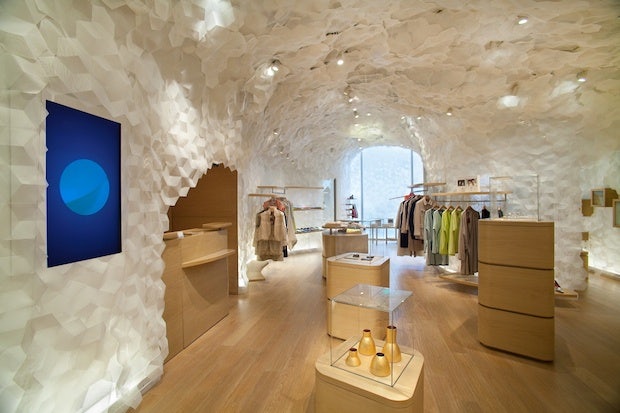Yet To Be Determined: How Many Chinese Consumers Do The Same?#

The interior of a store location for Hermès-owned label Shang Xia, which is set for an upcoming store opening in Paris as it looks abroad. (Jimmy Cohrssen)
A recent survey of 1,500 American consumers revealed that 32 percent of them would not knowingly purchase a product knowing it was made by a Chinese brand.
The survey, commissioned by the U.S. and China-based consulting firm HD Trade Services (HDTS), indicated that, by comparison, 81 percent of respondents would knowingly buy products by made by Japanese brands -- a sharply lower rejection rate of 19 percent.
In a summary of the findings posted on the company’s website, HDTS president Daniel Sperling-Horowitz expressed the belief that “this stigma towards Chinese brands is based predominantly on the perception that Chinese products are of lesser quality, and a general disapproval of Chinese policy.”
The survey caught the eye of China Daily, which posted a brief article about it this weekend. The story noted that a previous HDTS survey of American consumers found that 94 percent of respondents could not name a single Chinese brand. Among those who could, Lenovo was the most frequently mentioned, followed by Baidu and Huawei.
In response to a comment on the article posted on the HDTS website, Sperling-Horowitz wrote that he was “tempted to conduct further research to learn what percentage of Chinese consumers would buy Chinese-owned brands.”
Such findings would likely be of interest to Chinese luxury brands, which have struggled to find their footing in both domestic and international markets. Some, such as Bosideng, Shanghai Tang, and Shang Xia, are achieving a certain success abroad, with store openings in the United States and Europe. In these cases, though, ownership by foreign conglomerates appears to be a factor in the strategy and its success.
As high-end Chinese brands strive to establish themselves in both the mainland and international luxury landscapes, consumer acceptance in China remains a crucial factor. Perhaps in the next survey to hit China Daily, the domestic luxury industry will figure more prominently.
